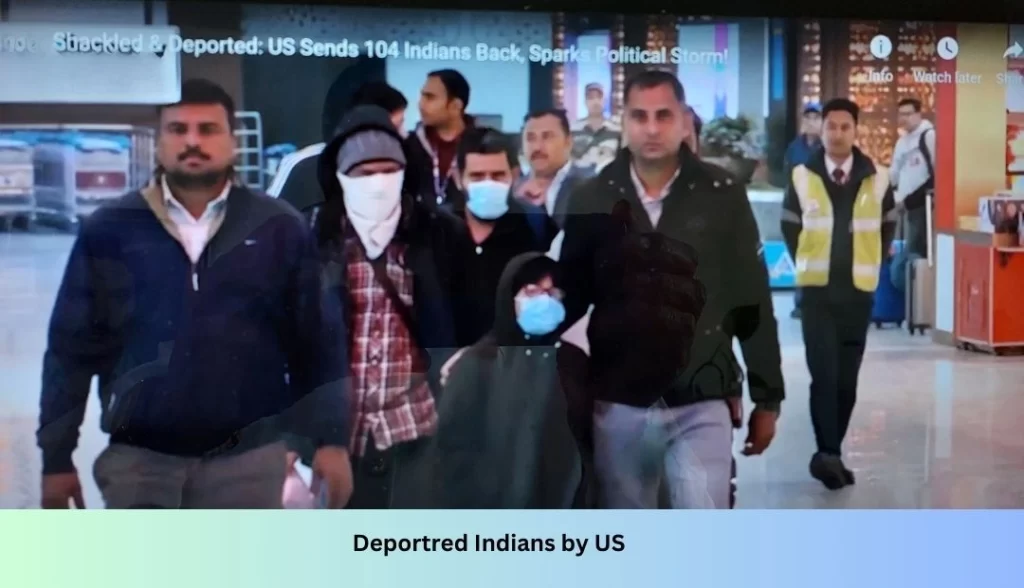Arriving in Amritsar under distressing circumstances, 18-year-old Robin Handa was one of 104 Indians deported from the United States on February 5, 2025. Arrested at the U.S.-Mexico border on January 22, he recounted the harsh treatment deportees endured, including being shackled, masked, and kept in the dark about their destination throughout the grueling 40-hour flight back to India.
Among the deportees were 19 women and 13 minors, including a four-year-old child. Many described the experience as dehumanizing, with their hands cuffed and legs bound with ropes for nearly two days.
Handa, the son of a motor electrician, had traveled to the U.S. with dreams of a better future after completing a course in Computer Science from the Industrial Training Institute in Ambala. His father took on a debt of ₹30 lakh to pay an agent who promised a safe route to the U.S. “My father put all his savings into this, selling land and borrowing more, only for me to be treated like a criminal and sent back in chains,” Handa said, expressing his frustration over the lack of employment opportunities back home that had forced him to seek a future abroad.
Handa’s journey to the U.S. was nothing like what the agent had promised. Departing from Mumbai on July 24, he was first flown to Ghana before enduring a dangerous overland route through Brazil, Peru, Ecuador, and Colombia, before finally reaching the U.S.-Mexico border after nearly six months. “I had to cross rivers, climb mountains, and survive the Amazon jungle with little food. If someone fell sick, they were left behind,” he recalled.
Similarly, Omi Devi, 45, her husband, and their two teenage children took a different but equally treacherous route. Devi’s brother, Rajesh Kumar, recounted how the family had hoped to reunite with their eldest daughter, who was studying in California. Their journey took them through Italy, France, Costa Rica, El Salvador, and Mexico before they finally crossed into the U.S. near Tijuana on January 23. Within hours, they were detained by armed personnel. “For 10 days, they were held in a camp, confined in tiny six-by-six-foot cabins,” Kumar said.
Devi described the journey home as even more distressing. “We were handcuffed and shackled the entire way. My children and I were barely given anything to eat, and we didn’t even know we were being deported until we landed in Amritsar,” she said.
Handa recalled his time in a detention camp in Santiago, where he spent over 10 days before being forcibly placed on a deportation flight. “They treated us like prisoners. Even women and children were shackled. Sikh deportees were asked to remove their turbans and were only allowed to wear them again after landing in India,” he said.
Another deportee, Harwinder Singh from Punjab, revealed that he paid ₹42 lakh to an agent who promised him a work visa. Instead, he found himself on a dangerous trek across mountains and through seas, only to be detained and deported. “We were forced to travel in overcrowded boats, one of which capsized. I saw a man drown, but nobody stopped to help,” Singh said, recalling the harrowing ordeal.
The incident has sparked strong reactions from politicians and human rights activists. Several opposition leaders questioned why deportees were transported in chains on a military plane despite India’s diplomatic ties with the U.S.
“This is an insult to India,” Congress MP Shashi Tharoor stated, criticizing the treatment of Indian migrants. Another MP, Manish Tewari, condemned the deportation, calling it “inhuman.”
Despite the widespread outrage, the Indian government has downplayed the treatment of deportees, stating that they are in discussions with U.S. authorities regarding immigration policies.
Meanwhile, many of the deportees are left grappling with shattered dreams and the burden of debt back home. As they struggle to reintegrate into society, their experiences serve as a grim reminder of the perils of irregular migration and the harsh realities of seeking a better life abroad.







